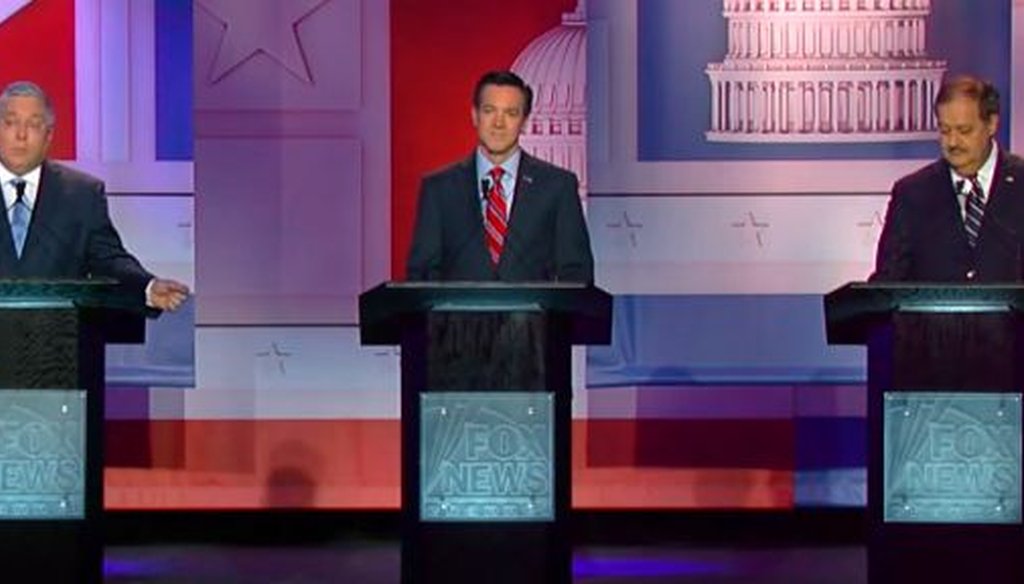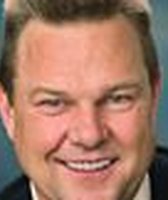Stand up for the facts!
Our only agenda is to publish the truth so you can be an informed participant in democracy.
We need your help.
I would like to contribute

The three leading Republican candidates for a West Virginia Senate seat meet for a debate on May 1. Left to right: Patrick Morrisey, Evan Jenkins and Don Blankenship.
Tuesday’s Republican primary for a U.S. Senate nomination has been intense -- and the veracity of the leading candidates has often been challenged.
Former coal CEO Don Blankenship, U.S. Rep. Evan Jenkins, and state attorney general Patrick Morrisey are vying to face Democratic incumbent Sen. Joe Manchin.
The attacks have ranged from important issues in West Virginia, such as opioid abuse, to allegations that one candidate or another once held positions that today are considered heresies by the Republican Party base.
On the eve of Election Day, here’s our recap of some of the biggest themes of the race.
Blankenship is running for Senate despite spending a year in jail for conspiring to violate mine safety regulations. The prospect that a candidate with his background could win the nomination has prompted national Republicans to target Blankenship in the hope that he doesn’t win the primary.
Sign up for PolitiFact texts
Blankenship responded to attacks against him by a PAC aligned with Senate Majority Leader Mitch McConnell by going after McConnell’s family ties to China. (McConnell is married to Transportation Secretary Elaine Chao.)
"Mitch McConnell was one of the few senators that voted after Tiananmen Square not to have punitive actions against China for human rights violations," he said in a May 1 debate.
We rated the statement False.
We found this assertion inaccurate in multiple ways. McConnell and every other Senate Republican voted in favor of sanctions in the immediate aftermath of Tiananmen Square; the legislation Blankenship later clarified that he was referring to came 11 years later. The later bill arguably weakened but did not eliminate human-rights leverage over China. Meanwhile, the vast majority of Republicans and Senators overall -- not just a "few" -- supported the final version of the measure.
Over the course of his political career, Jenkins has switched partisan affiliations several times — giving his opponents material to paint him as out of step with today’s GOP electorate.
In the May 1 debate, Morrisey said to Jenkins, "You said your philosophy was ‘progressive mainstream’ back in 2003."
We rated the statement Half True.
We found that Jenkins did use those words in an aspirational tone for a 2003 newspaper article. But Jenkins was talking about issues a hypothetical Democratic gubernatorial candidate should run on, not his own political philosophy. In addition, the term "progressive" was not as widely used as a synonym for "liberal" in 2003, and Jenkins articulated no clearly liberal stances in that interview.
During the same debate, Morrisey touted a list of left-leaning positions he said Jenkins espoused: "I wasn’t the one recruited by the liberal establishment because of his very questionable record. Once again, Obamacare support, cap and trade support, donating to Joe Manchin, holding a fundraiser at his house. That’s not the West Virginia values we need to drain the swamp in Washington."
Jenkins countered, "All the things Patrick (Morrisey) is saying — (that I supported) Hillary Clinton, cap and trade, Planned Parenthood — PolitiFact went through each and every allegation and said, ‘False, False, False, False.’ "
Jenkins correctly cited PolitiFact’s conclusions on the three specific topics he singled out. However, his dismissive responsive obscured that Morrisey’s other examples, about supporting Manchin and Obamacare, were more accurate. ’. So we rated the statement Half True.
For his part, Jenkins has attacked Morrisey for his previous political experience in New Jersey.
On one occasion, Jenkins tweeted that Morrisey "ran for Congress in NJ as pro-choice," referring to a 2000 congressional race.
We rated Jenkins’ this statement False.
The Jenkins campaign cited a 2000 AP story that said Morrisey was opposed to a constitutional amendment to ban abortion, one of the more extreme tactics among those who oppose abortion. However, experts and anti-abortion groups told us that opposition to the amendment would not have made Morrisey an abortion rights advocate.
Morrisey said he had opposed abortion except in cases of rape, incest and when the woman’s life is in danger.
In an earlier debate, Blankenship said, "We have to stop illegal immigration, costing us $130 billion a year to house and feed and give benefits to people that shouldn’t be even in the country."
We rated the statement Mostly False.
Immigrants in the country illegally do generate costs for taxpayers, but experts say it’s difficult to determine a precise figure largely because there isn’t reliable data. Blankenship’s claim is based on a 2017 report based on methodology broadly panned by experts..
Particularly relevant to Blankenship’s statement was that the report’s estimate did not factor in housing costs.
Jenkins, meanwhile, tried to portray Morrisey as working to benefit immigrants in the country illegally. Jenkins’ ad said, "In Congress, Morrisey wrote the health care law giving free health care to illegals."
That’s Mostly False.
For starters, Morrisey Morrisey was a congressional staffer at the time, so he only helped write the legislation.
The 2003 law also didn’t give "free health care to illegals." The law primarily created the Medicare prescription drug program. It included a section that addressed reimbursement for the care of patients who could not afford services (including immigrants) for hospitals.
That right to be covered -- which addressed emergency care only, not a full suite of health care services -- had been mandated years earlier, in 1986, by a separate law.
West Virginia has the highest overdose death rate in the nation.
We know, because we fact-checked that claim by Jenkins and rated it True.
West Virginia’s drug overdose death rate is a full one-third higher than the state with the second-highest rate, Ohio.
The candidates’ have had to address the opioid epidemic in other ways.
Morrisey’s opponents have questioned his family ties to health care companies involved with selling and prescribing opioids.
We took a closer look at this question.
Prior to becoming attorney general, Morrisey lobbied for the Healthcare Distribution Management Association, a group that represents drug wholesalers, while working for the law firm King & Spalding, the Charleston Gazette-Mail has reported. Among the association’s members is Cardinal Health, which had been sued over the opioid issue by his predecessor as attorney general.
The questions have extended to his wife, Denise Henry Morrisey, who is a partner with the Washington lobbying firm Capitol Counsel.
According to federal disclosure forms for 2017, she was a named lobbyist for several major pharmaceutical clients.
We were unable to confirm whether any of Denise Henry Morrisey’s specific lobbying work addressed opioids. However, several of her clients are involved in opioids. Sanofi subsidiary Francopia bills itself as "one of the world’s major opiate producers." Members of the industry group BIO include Allergan, Johnson & Johnson, Janssen, and Purdue Pharma, all of whom are being sued by New York City over their roles in opioids. And the membership of the Healthcare Leadership Council includes Cardinal, Sanofi, Johnson & Johnson, and Pfizer, which has been a smaller opioid player.
Our Sources
Previous PolitiFact fact-checks






































